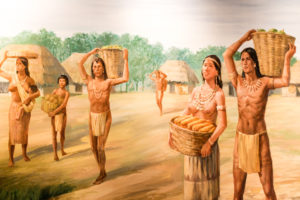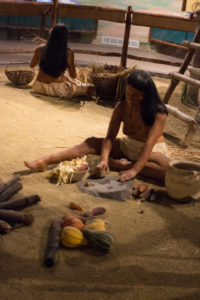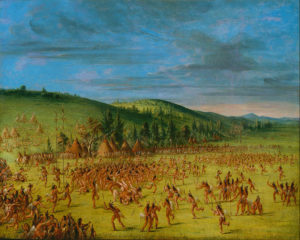The year in the Natchez Calendar began around the early spring according to Antoine-Simon Le Page du Pratz and other among his French contemporaries. A grandiose celebration called Deer Feast that opened the year took days to complete, a magnificent festival of traditional food, games and recreational reenactments of the past history key events.

Beginning of each new month was also marked with smaller scale festivals, usually made from the principle fruit of the earth peculiar to the season, while the name of each month derived from the same source.
The first month on the Natchez calendar was called Deer Moon and it was roughly equivalent to the month of March. It was said to signify the renewal of the year which was said to “spread universal joy.” Celebrated with the famous Feast of the Deer, the beginning of new span of seasons did not leave people indifferent or disappointed.
On the second month – Strawberry Moon (roughly equivalent to April) – women and children went out to collect early strawberry, with the lovely celebration full of delicatessen made of the juicy forest fruit keeping entire villages in most jovial of moods. As tradition dictated warriors would go out to, to hunt wood ducks and present those as gifts to each other and their womenfolk.
The third month of the Natchez calendar was called Little Corn Moon (roughly equivalent to May). This one was awaited with impatience, especially the early first harvest it brought, the gift of the “little corn” crucial if the main harvest of the previous autumn was not sufficient to last the community through the entire winter.
 The fourth month, called Watermelons Moon (roughly equivalent to June), saw men going out with massive nets, set on catching the fish that was running up against the current of the rivers at this time of the year. As watermelon seemed to be a non-indigenous fruit to the American continent, the name of this month as recorded by the 18th century French might have been called differently in more in more indigenous times.
The fourth month, called Watermelons Moon (roughly equivalent to June), saw men going out with massive nets, set on catching the fish that was running up against the current of the rivers at this time of the year. As watermelon seemed to be a non-indigenous fruit to the American continent, the name of this month as recorded by the 18th century French might have been called differently in more in more indigenous times.
The fifth month was called Peaches Moon (roughly equivalent to July) and saw plenty of forest fruit collected and brought back to villages not only as means of food or sweeteners but also as offerings to the Great Spirits, and even the ruler himself, the Great Sun.
A month later, on the sixth moon called Mulberries Moon (roughly equivalent to August), those were certain birds that were offered to the Great Spirits and sent to please the Great Sun.
The seventh month, called Maize or Great Corn Moon (roughly equivalent to September), threw all villages and towns into as grandiose and important celebration as the one that began the new year – the Harvest Feast. This was the time of the harvest, the season that told people with certainty if they were expected to have a good comfortable winter or a lean one.
Through the eight month of the Natchez calendar that was called Turkey Moon (roughly equivalent to October) wild turkeys were migrating from the thick of the woods to enter the more open ground in search of nettle seeds, presenting opportunities. Some of those fowls were hunted in order to store their meet in a dried or salted manner for the winter; others were merely captured, to be kept in the vicinity of the villages and serve as future food guarantee.
The ninth month, called Bison Moon (roughly equivalent to November), would sweep by busily, with massive hunting operations of well coordinated groups of hunters, with even women coming to help around the hunting camps, skinning the game and preparing its meat for the winter. In some villages only too young and too old along with mothers of little children would stay in at home.
The tenth month was called Bear Moon (roughly equivalent to December), and it went by in a slower pace, with the men sill spending their time in hunting concentrated activities but on a smaller scale. No notable feasts were held through this time of the year.
The eleventh month, called Cold Meal (roughly equivalent to January) was dedicated to hunt of geese, ducks and other water fowl.
The twelve month was called Chestnut Moon (roughly equivalent to February). Not much had been done in the way of ensuring community’s wellbeing through this coldest time of the year, with chestnuts and other edible seed collected and stored quite a few moons before.
The last thirteenth moon was called Nut Moon (to round the Moon Calendar’s year up). At this time of the year indeed nuts were broken to make breads mixed with corn meal.
And then, it was back to the beginning of spring and the happy celebration of the awakening season and the new round of the calendar yearly activities.
An excerpt from “Dark Before Dawn“, The Mound Builders Series, book #1.
Word of the battle at the town whose name she didn’t even remember reached Serpent Mound just as the harvest ceremony she found alien and strange had ended for good.
Relieved to have the dismal gathering at a dismal square they called a “plaza” over and done with, Tehale was just about to retire to the so-called “grand house,” which was nothing but a significantly larger cabin than the rest, even if situated on a one-story mound with stairs, when a sweating man with worn looks burst into the square, startling everyone, making the crowds murmur in alarm. They were jumpy, those people, her new so-called subjects, or rather, country-folk, even though she preferred not to think of them in such terms, a temporary dweller of this place that she was, until summoned back to great city, having proven her worth in the eyes of her revered aunt, the Female Sun. Ever afraid of the northern barbarians, those people would watch their river and everyone who was approaching it with its current, but the messenger apparently came from the south. A small consolation in light of his news. Apparently, the mysterious raiders did not always sail with the current. Or maybe they used rivers others than this northern watershed.
As though it mattered, she thought, rolling her eyes and snorting quietly, mainly to herself. This town had walls, even if not as sturdy or high as the wall separating Quachil Thecou from the Great River. Still, to invade such a place should be difficult, should it not? But those people went into a fit of panic, stupid storage room mice that they were.
“What is happening?” the women around her murmured, unimportant local nobility, the ruler’s several wives and other female relatives. “How did this man dare to burst in here like that?”
As though their pitiful festival was a ceremony upon the Grand Plaza of Quachil Thecou, with thousands men and women crowding it from every direction and dazzlingly dressed priests and royalty pontificating and paying respects to the gods. Here, in the meager shadow of the Serpent Mound, grand ceremonies meant a few hundreds of locals crowding the dismal square facing their dismal pair of mounds, not even offering before the only remarkable construction this petty settlement had, the long serpent-like earthwork stretching outside the protection of the wall. Stupid and unworthy.
Tehale ground her teeth and proceeded to ignore her fellow womenfolk, drawing from her experience back in the female hall of the lower terrace, a mere memory of which was enough to twist her stomach painfully and bring annoying wetness to her eyes.